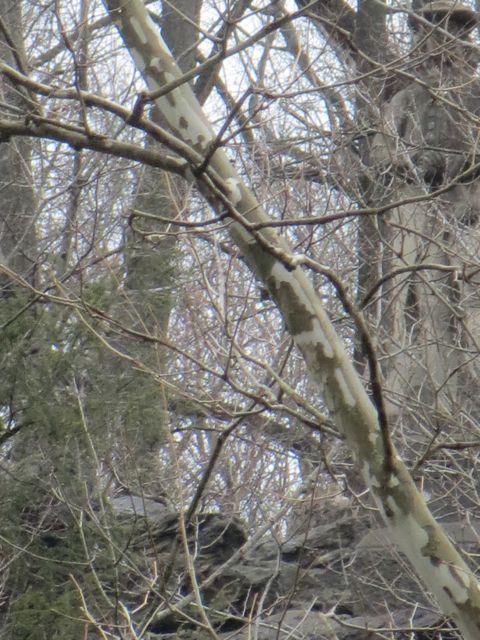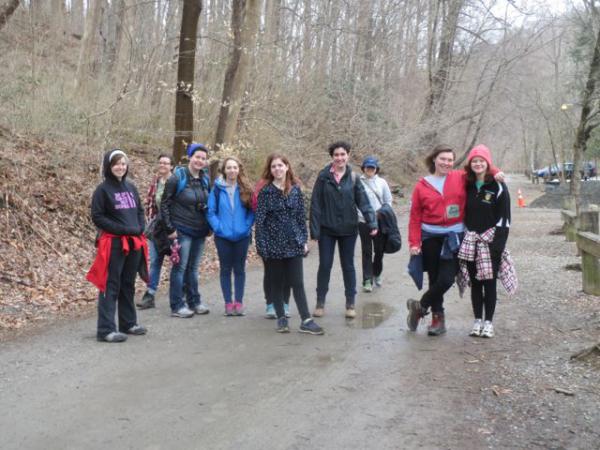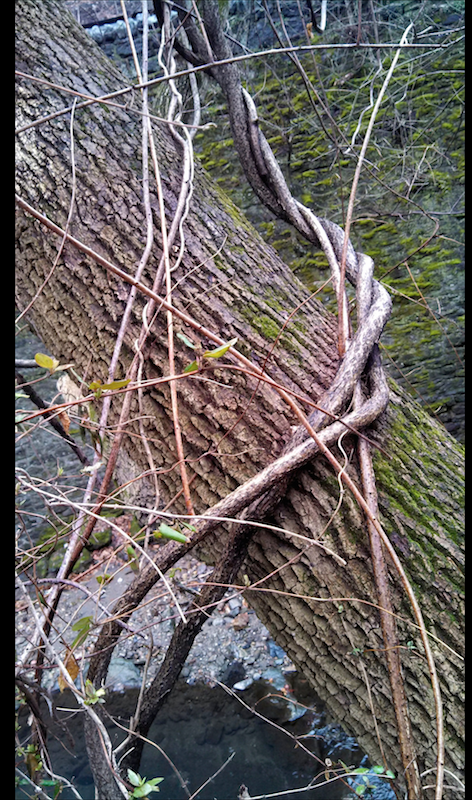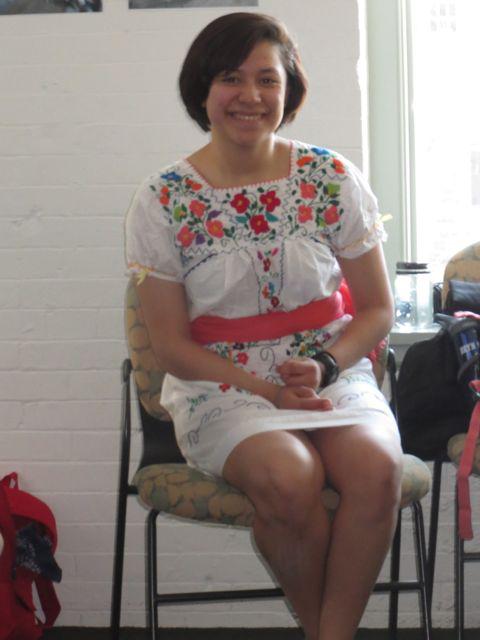Serendip is an independent site partnering with faculty at multiple colleges and universities around the world. Happy exploring!
Eco-Literacy 2014

Welcome to the on-line conversation for Eco-Literacy, a 360°
cluster being offered @ Bryn Mawr College in Spring 2014.
POST YOUR THOUGHTS HERE
______________________________________________________________________________________

"What I would have said:" Making Post-structuralism & Deep Ecology more Porous
When reading "The Land and Language of Desire" and thinking of how it would be possible to "collapse the distinction between nature and textuality", I kept reflecting back to my Eco-Artist Ian Hamilton Finlay and the ways in which he weaved language into his art, bringing together two very different disciplines into one object. The art and literature were seamlessly weaved together in such a way it was hard to find any distinction between art/landscape and the language and poetry he used in his work. I also thought about John Dixon Hunt's quote about Finlay's work, specifically that "the ideal gardner is the poet". How can we see post-structuralism and nature/the land as more porous to one another? As Campbell states " what makes one of us care about textuality, where another cares about the land?" (134). Both studies and writing about land and language have inherent value, but should there always be a distinction between them? When should we make them porous to one another? When should they be made to be separate units of study? And who should decide?

Changing Approaches to Ecological Education
Unfortuanately, I was unable to physically be in my classes yesterday, but I found the Judson reading to be very englightening and interesting. I was especially drawn to the way she found imaginative education and ecological education to be somewhat in tension, and felt like in some ways the reading raised more questions than answers for me. Judson asks: Is it possible for students to develop ecological understanding when the teachers may lack this ecological understanding? And I wonder: Is there a standardized type of curriculum that allows teachers with or without the ecological understanding to develop their students' understanding? How can we balance imaginative education and ecological education in fostering students' emotional connection to nature? These are all difficult questions to address given budget constraints, teaching preparation programs, and other logistics, and are even more difficult in some cases, where the outdoors are not an accessible place to create a "classroom." To end on a lighter and more postive note, though, I think Judson expressed the importance of conveying the interdependency between humans and the environment in schools. It won't be easy, but I do think this can be done in a variety of settings, and teachers can foster their students' emotional and personal connection to nature.

Climate Signals, Growing Louder
http://www.nytimes.com/2014/04/01/opinion/climate-signals-growing-louder.html --
or, 'how much latitude can we allow,' in telling our stories?

representing toleration
 |
 |
dunno...somehow seems that my misty, off-center image represents "toleration"
better than does the brightly-lit one, which seems so...um, judgmental?

Thoughts on the Wissahickon
I’ve been here before.
There is a sense of excitement that accompanies encountering the familiar, paralleled by discontentment at being unable to articulate the vague and seemingly random connection I am feeling...
I felt it even as we drove to our destination, passing the rooftops of buildings in Manayunk. Manayunk, which according to Wikipedia, literally translates from the Lenape language as, “place to drink.” It was their word for River. I take note of the tall sign that marks a movie theatre. It is also the sign I look for to indicate the entrance to a small outlet containing a liquor store.
“Place to drink” was indeed my experience with Manayunk this past summer, though I recognize that the Lenape Indians and I most likely have different interpretations of the word “drink.”
I’ve been here before.
We step out of the vans and the sense lingers. Anticipation holds a sense of remaining unfulfilled… Is that what this unease is, being unable to place a finger on how you know a place or why you know it?

Week 14 Friday Links
ECON 136: Week 14, Friday
Effective Communication of Quantitative Information
Here are the examples I presented in class
Dan Heath on making things stick and the Fishman article on water bottles.
Hans Roling on measuring human progress
Annie Leonard on responding to climate change

oh, now you tell me.
"Are we really still in Pennsylvania?" I kept asking. "This place has been here for the past four years?" I found it hard to believe. Wissahickon holds the kind of beauty that in my mind is reserved for mountains of Colorado or West Virginia. Or, at the very least, rural-rural PA. But not Philly. Not Germantown. Not 20 minutes away from the place I've been living for the past four years of my life. For me, Bryn Mawr has never been a place to be connected to nature, to escape from the developed world. I suppose I've tried a couple times - sitting quietly at the labyrinth and lookin at the sunset, pretending the grass around me wasn't perfectly groomed and ignoring Rhoads and the vast athetic fields stretched out before me. The back porch of Batten offers a beautiful view into the woods, but just beyond that is a big road and it's hard to block out the noises of cars zooming past. The stars are somewhat visible at night, but not to a large degree, what with all the light pollution from the city and suburbs. I've resigned myself to a life without much connection to nature whenever I'm at school.

Walking the Wiss
I've been to the Wiss twice before, though only in the summer, and both times during the cross country pre-season. The whole team–at least those who could run–piled into the BMC athletic vans for a morning run along the trails. I remember covering a good five-six miles, climbing up hillsides, jumping rocks, skirting tree branches and hurtling small streams, cursing the hills for being so steep only to feel the elation of finally cresting the top. Rain aside, the Wiss was just as gorgeous coming back in the spring as it was in the summer and I did enjoy my time there. At the same time, however, I could not help but feel my own limitations. I wanted to climb to the top if the rock formations, to run up the trails as they spiralled higher and higher till they reached the top of one slope, only to find another slope still left to summit. I wanted to run like I had so many months ago; to take in the fresh air, the dirt, the rocks, the trees, the river; to feel that same freeing happiness I remembered. Yet this time around, it felt like I was watching myself and my classmates enjoy the experience, like there was a wall separating me from everything else. Maybe it's just the concussion talking, and regardless I loved being outside and escaping the confines of my dorm room, but I couldn't help but feel that something was missing...

Images of Wissahickon Valley Park
Enjoy the pictures of yourselves--but also don't miss that
wood duck @ the end: he is totally postmodern! 

Wandering around Wissahickon
I have to admit, I was feeling a bit down on Friday--you could say I'm not the biggest fan of rain so I was a grumpy about hiking in the weather we were experiencing and feeling tired from a long, grueling week. But once we started walking around together, I immediately felt like a load had been lifted and I could truly feel a sense of peace. I left behind the stressful week I had just had and listened to the rain falling, friendly conversations among my classmates, and took in the fresh, lush smell of the trees and creek. Spending time in Wissahickon, as my "ditch" for the day was exactly what I needed to feel refreshed and rejuvenated, ready to embrace and take on the rest of the semester.

Wissahickon
 There was a point on our hike that struck me, where we crossed a bridge and climbed up a hill and looked out at tbe view of where we had just stood on the bridge. So much of life feels like that; so often you get used to one perspective, only to then discover the fleetingness of any one 'phase' in life, and promply move on, only able look back at where you were, but never again experience its perspective. Makes me think of Joni Mitchell...
There was a point on our hike that struck me, where we crossed a bridge and climbed up a hill and looked out at tbe view of where we had just stood on the bridge. So much of life feels like that; so often you get used to one perspective, only to then discover the fleetingness of any one 'phase' in life, and promply move on, only able look back at where you were, but never again experience its perspective. Makes me think of Joni Mitchell...
And the seasons they go round and round
And the painted ponies go up and down
We're captive on the carousel of time
We can't return we can only look
Behind from where we came
And go round and round and round
In the circle game

She's got you high and you don't even know it
I'm walking through the trails- conversations in the background fading away in the distance as my lense focuses more and more on what my eyes lock on to. It fascinates me how perspectives can differ so much on where you stand, everything dependent on an angle. As I walked through the Wissahickon Valley, I'd take several pictures from different angles. Some were standing up, others squatting, and even making weird neck movements. Every picture captured something different. We take for granted light and air, the simple things in life yet they're what makes us exist. They're what made every scene uplifting...every picture different...every experience worth breathing.

She's got you high and you don't even know it
I'm walking through the trails- conversations in the background fading away in the distance as my lense focuses more and more on what my eyes lock on to. It fascinates me how perspectives can differ so much on where you stand, everything dependent on an angle. As I walked through the Wissahickon Valley, I'd take several pictures from different angles. Some were standing up, others squatting, and even making weird neck movements. Every picture captured something different. We take for granted light and air, the simple things in life yet they're what makes us exist. They're what made every scene uplifting...every picture different...every experience worth breathing.

She's got you high and you don't even know it
I'm walking through the trails- conversations in the background fading away in the distance as my lense focuses more and more on what my eyes lock on to. It fascinates me how perspectives can differ so much on where you stand, everything dependent on an angle. As I walked through the Wissahickon Valley, I'd take several pictures from different angles. Some were standing up, others squatting, and even making weird neck movements. Every picture captured something different. We take for granted light and air, the simple things in life yet they're what makes us exist. They're what made every scene uplifting...every picture different...every experience worth breathing.

Wissahickon Reflections
When I arrived back at Bryn Mawr after our trip to Wissahickon and saw one of my friends, the first thing she said to me was, "So I heard you got lost." She was jokingly referring to the first part of our walk, when jccohen and I, absorbed in our cameras, fell behind to the point where Hummingbird had to call and ask where we were. We kept pace after that point, and I fell into conversations with various groups of people, but the trip felt somehow different after that- not better or worse, just like there was an an after where I was engaged in conversation and community, and a before where I was silent staring through a lens.

Wissahickon, lost in the rain, content.
I thoroughly enjoyed our trip to the Wissahickon State park on Friday. One particular aspect of it that fascinated me was how we dealt with unexpected situations (sometimes they would be considered problems, but I don’t think many of us viewed them as such)—getting lost, and rain. As an outdoorsy person, I love the rain and don’t often shy away from being out in it. Even as I sit here in my bedroom typing, my two windows are open and the sound of the heavy raindrops and bird songs, mixed with the fast-moving flooded creek below is calming. Being in the light rain at Wissahickon made me feel more connected to the park, like part of the ecosystem that is involved by choice, but also involved by simply being, because at the end of the day humans are part of these modern ecosystems too. I was out in the rain, just like all the other animals present in the space. Also on a more practical note, I loved how I didn’t hear anyone in our group complain about the rain, I instead noticed how we all approached it as an adventure.

Novel Content
"I've had thoughts but not written anything. I am happy and at peace, though, so it's alright. I am tired and don't want to find problems." That's all I wrote in the pocket notebook I carried all day with me on our trip in Wissahickon. I feel like I always push myself to try and find issues with things; keep myself from totally enjoying an experience. But cynicism is exhausting, and I was truly happy during our trip - I don't want to steer away from that. Perhaps, though, I don't know how to write about happiness?
Being content isn't triggering enough to get me to write. Is that okay?
Would we be in school if everything in the world was right, and everyone was happy? Would we learn about economics if the system was working smoothly and had no problems? Can you write a novel without the conflict, struggle, and difficulty that lead to resolution, or some sort of conclusion?
I don't really have much to say.




